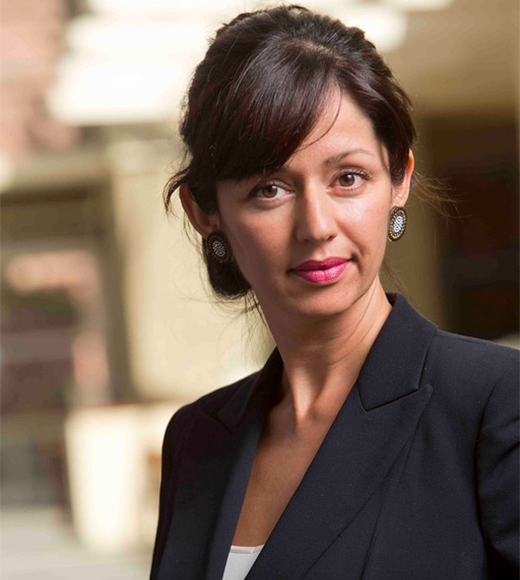Faculty Feature: Professor Amelia Miazad

Professor Amelia Miazad is a leading expert on corporate law and environmental, social, and governance (ESG) issues. She has published her research in Vanderbilt Law Review, Minnesota Law Review, UC Davis Law Review, UC Hastings Law Review, and the Journal of Corporation Law. She also has created and teaches courses for corporate executives and board members. As creator and host of The ESG Beat Podcast, she interviews both practitioners and academics. Before coming to UC Davis, Professor Miazad was a Senior Research Fellow at UC Berkeley School of Law, where she founded and led the Business in Society Institute.
How did you become interested in ESG issues?
My father was an economist in Afghanistan, and he often spoke to me about market failures and potential solutions. So, growing up, I was kind of steeped in the belief that businesses and investors, when given the right incentives, have immense power to have a positive impact on society. Of course, the opposite was also true — corporate action or inaction can, and often does, lead to significant harm.
As I began my career, I encountered general counsel and corporate executives who wanted to move beyond legal compliance in addressing environmental and social risks. However, I quickly realized that certain corporate law rules and norms were hindering these prosocial initiatives. The norm of prioritizing shareholder value was particularly entrenched, for example.
This realization sparked my interest in how corporate law could be reformed to not only permit, but actively encourage, corporations to tackle their negative environmental and social impacts. While we now refer to these efforts as ESG (Environmental, Social, and Governance), the term wasn’t widely used when I started exploring these ideas. In fact, I accidentally named my youngest daughter with the initials ESG, long before it became a buzzword (I feel guilty!).
What originally drew you to the law?
My parents desperately wanted me to be a doctor. So, in some ways, being a lawyer was a way for me to rebel! I have always been drawn to philosophy, and particularly normative and ethical questions. My students recognize this in my teaching, as I draw out policy questions in each lecture.
To me, the law represents a reflection of society's collective ethical values; it's a way to put those values into practice and to reshape them. Certainly, this process is far from perfect. Not everyone has an equal voice, and the legislative process is often deeply flawed, especially with the influence of lobbying (including corporate lobbying!). Despite these challenges, I still believe in the power of the law to drive meaningful change and to encourage a more just society. And that is still what draws me to the law.
What would your students be surprised to learn about you?
I am a refugee from Afghanistan and the first Afghan-American law professor in the U.S. (as far as I know). Also, I do not like chocolate (sorry!).
What do you most enjoy about teaching? What do you hope students gain from your courses?
I absolutely love teaching corporate law, and it’s tough to pinpoint just one aspect I enjoy the most. For me, teaching this subject keeps me deeply engaged with it. In every class, I strive to connect our lessons to current events. Whether it’s Patagonia’s decision to change its corporate structure to further its mission of environmental protection, Tesla’s move from Delaware to Texas, or OpenAI’s innovative governance model as a hybrid non-profit (for now!), corporate law is constantly making headlines.
I hope my students come away with a clear understanding that corporate law is more than just a set of rules; it profoundly influences the actions of directors and officers. Given the significant impact corporations have on society — both positive and negative — it’s crucial for students to grasp how corporate law works. More importantly, I encourage them to think creatively about how we might adjust these laws to foster better outcomes for everyone.
Do you have any hobbies or notable interests?
I love being outdoors, and my favorite activity is hiking but I also enjoy skiing (downhill and cross-country).
What are you grateful for?
Uh oh, this may be a little much, but if I am going to be honest, I am very grateful for my husband. I’m married to an incredibly kind and supportive man, and I met him in law school! And I am grateful for our family — we have two daughters — ages 17 and 14.
Additionally, I feel lucky to be a law professor at King Hall during such a pivotal time in the evolution of corporate law. It’s an exciting moment to be part of this field!
Do you have one piece of advice for King Hall law students?
I have more than one. First, no matter where you work — be it a law firm, corporation, government office, or non-profit — look for ways to make a positive impact. Each institution has its own unique tools and resources that you can leverage to drive change in the world.
My second piece of advice is to resist feeling stuck in your career. The legal profession is incredibly versatile, and if you find yourself on a path that doesn't resonate with you, don’t hesitate to change direction. I made a significant pivot from practice to law school administration to teaching and scholarship, which some might consider unconventional, but it allowed me to explore new opportunities and continue to grow. Embrace the flexibility of your career and chart your own course!
Check out last month's Faculty Feature here.
